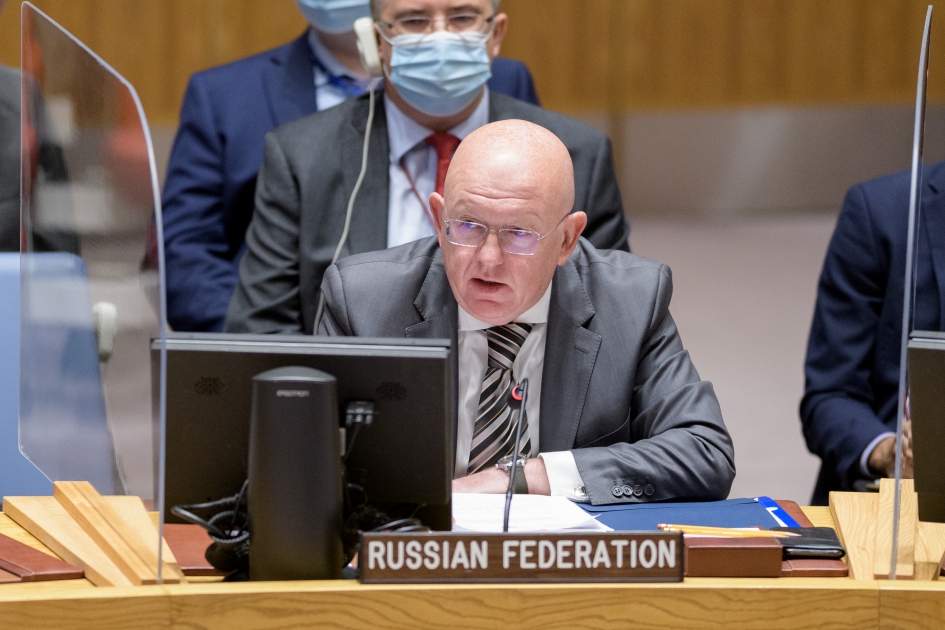Statement by Permanent Representative Vassily Nebenzia at Security Council briefing "Threats to international peace and security caused by terrorist acts"
Mr.President,
We thank Mr.Voronkov and Ms.Coninsx for providing detailed analysis of the situation in the area of countering ISIL. We support the activity of mechanisms that you lead. We thank our longtime friend Mr.Moradian for his meaningful and emotional, yet sobering and highly relevant statement.
What is in the spotlight of global attention today is the situation in Afghanistan. When speaking of counterterrorism, we surely cannot bypass the state of affairs in that country.
It might seem that since the tragic events of 11 September 2001, for 20 years on end Afghanistan has been packed with US and NATO troops, instructors and advisers, who were deployed to pursue one officially proclaimed goal – fight against terrorism and training of Afghan national security forces to get them ready for such fight. All this took immense human and financial resources.
So what are the results of this help and presence? Once the foreign aid has left, the twenty years’ worth of efforts reduced to a zero. Everything faded into obscurity. No one wanted or was able to fight for the values and interests that foreign powers had been disseminating.
Has Afghanistan ceased to be the place where terrorist and drug-related threat comes from? No, it has not! However this is something the new Afghan authorities and the country’s neighbors will have to deal with. Once Western contingents were gone, Afghans found themselves faced with even a greater pile of problems.
We would like to underscore that the Russian Federation will interact only with those political forces in Afghanistan that will not be connected to terrorists, first of all ISIL and Al-Qaida and their affiliated groups. We trust that all Afghan sides will refrain from using violence and promote peaceful settlement.
Mr.President,
Thanks to consistent efforts of Russian and Syrian military, the potential of terrorist organizations that are active in Syria has been significantly reduced over the recent years, first of all that of ISIL. At the same time, separate terrorist cells still remain active and pose a considerable threat.
The most numerous terrorist group is 'Hayat Tahrir al-Sham' that evolved from “Jabhat al-Nusra”. By various estimates, HTS has from 10 to 15 thousand people. What complicates the fight against this terrorist organization is the attempts of some stakeholders to present it as some sort of political opposition.
Another terrorist organization that is a source of danger in the region is 'Hurras al-Din', which is a Syrian branch of Al-Qaida. Its estimated capacity is 3.5 to 5 thousand people, half of which are foreign terrorist fighters (FTFs).
On our part, we continue rendering the required assistance to the Syrian authorities to help them counter terrorism.
The situation evolving in other regions of the world also raises our concern. ISIL is expanding its influence on the African continent. Their regional branches are receiving more autonomy, especially in West Africa and the Sahel, East and Central Africa.
Mr.President,
Once again, we would like to make clear the Russian position regarding the return of FTFs.
We stand for ensuring inevitability of punishment for crimes related to terrorism and conjugation of global efforts for this purpose. Under the international obligations, the FTFs that are involved in terrorist activity must be repatriated to their countries of origin to be held to account commensurately to the gravity of their committed offense. Otherwise those individuals must be brought before the court in the country where they committed a crime to be prosecuted under the national law of that state. It is the interaction with legal authorities of states where fighters are situated that will be key to resolving many problems related to FTFs and their family members.
Recently we have witnessed active spread of ISIL terrorist ideology among children in cyberspace. We call on member states to engage in prevention activities and work to achieve de-radicalization among this very vulnerable group.
Mr.President,
We cannot leave without attention the human rights aspects of combating terrorism. Mere rhetoric in support of human rights and gender aspects is not enough – the international community needs tangible results.
Again, we have to raise the issue of functioning of the Guantanamo prison. It has been many times that we heard US high-ranking officials proclaim an intention to shut down this facility that is famed for keeping people without charge or trial, using torture, inhuman and degrading treatment.
We trust that Western states will consistently observe their international legal obligations, safeguarded, in particular, by the Refugee Convention, Convention against Torture, and other fundamental international agreements. These obligations become even more important against the backdrop of mass exodus of people from conflict zones.
Fight against terrorism is our common task, and we call for cooperation.
Thank you.
